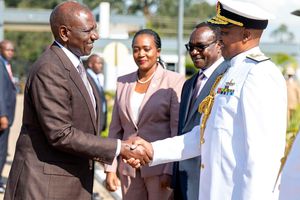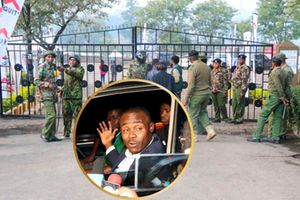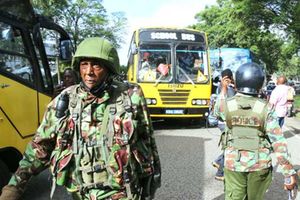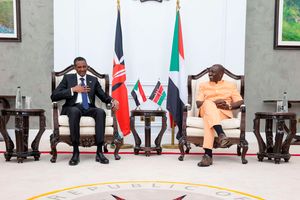
A picture taken on March 22, 2019, shows skulls of victims of Rwanda’s 1994 genocide at the Ntarama Genocide Memorial, in Kigali.
Genocides usually creep up on a country. Most people don’t see it coming, except for those who are trained to detect such cataclysms using early warning matrixes. In the aftermath of Kenya’s 2007 disputed presidential elections, almost no one foresaw the gathering genocidal clouds over the horizon.
And yet Kenya came within a whisker of state collapse because of the toxic tribal narratives fueled by the electoral season. From my perch in New York, I saw images of dystopia and Armageddon beamed daily on CNN.
I couldn’t believe that was my native Kenya, although I publicly predicted that December before the elections the probability of such an outcome. The lessons of Rwanda’s 1994 genocide were fresh on my mind.
It’s now two years before Kenya’s 2027 presidential elections, but I am starting to see the same eerie genocidal indicators I saw in 2007, two decades earlier. I have studied many genocides around the globe and what I see is very worrying.
Those who want to pooh pooh this dire warning do so at Kenya’s existential peril. Let’s not gamble with the only country most Kenyans call home. It’s no time to play Russian roulette with Mother Kenya.
The history of some of the most demonic genocides – Germany and Rwanda come to mind – suggests how easily the devil can strike. In my view, post-colonial states such as Kenya, whose nations are still in embryo, are most at risk of genocidal spasms.
Let me peel your eyes and jog your noggin. At the root of most genocides are a number of variables. These imperatives can lie dormant and give a country a false sense of calm before the storm. All they need is a singular event to ignite the match. That one event could be an act of involving two individuals who are symptomatic of the underlying grievances.
A key variable has been perceived or real ethnic (tribal) or racial inequities and disequilibria in the allocation of resources and the balance of political power. The most poignant manifestations are exclusion and discrimination in divvying up state largesse. It could be ethnic domination of state power by one group to the exclusion of others.
Discrimination
There’s nothing that powerlessness abhors more than discrimination. Racial, linguistic, national, religious, regional or ethnic entitlement of one group over another is the petri-dish of genocides. Identity is the battleground for power in diverse societies. Usually, the trigger is the fight over rights — which is really a fight over resources, over political power, and over recognition and belonging.
A state that fails to address these precursors of genocide invites the very worst proclivities in humans. That’s why equity and equality – though abstract concepts – must guide how a government allocates resources. Leaving some groups in a penurious existence while others roll in the dough invites catastrophe. Ethnic and other groups can resolve to die on their feet than live on their knees.
In Rwanda, the history – pre-colonial and colonial – of the power disparities among the Hutu, Tutsi, and the Twa exploded in arguably the most vicious and fastest genocide in our lifetimes. In a span of 100 days between April and July 1994, an estimated one million people, the vast majority Tutsi, were murdered and up to half-a-million women raped.
Many moderate Hutus and Twa were also killed and raped. I want to underscore the fact that these grim facts issued out of a terrible history of discrimination and exclusion. Importantly, the media played a key role in fuelling the unspeakable killings of Tutsis, especially men. Fiery and vitriolic ethnic incitement and rhetoric created a murderous frenzy in which neighbour hacked neighbour to death.
Politicians
I am issuing a dire warning to our politicians, especially to impeached former Deputy President Rigathi Gachagua, who in his public pronouncements appears to be stoking ethnic hatred and fear among the peoples of Mount Kenya ahead of the 2027 elections. He’s creating a siege mentality among the so-called Gema — Gikuyu, Embu and Meru — peoples.
As he tells it, Mr Gachagua would have you believe that his war is with his former boss President William Ruto. That may be so but it’s not lost on anyone that he’s forging an ethnically-driven anger among Gema against communities that support President Ruto. He’s setting Gema against other Kenyans. This powder keg may explode if Mr Gachagua’s political wing – centred in Mount Kenya – loses, even if fairly, the 2027 elections.
This is how tribal incitement works. A group is whipped up by a political demagogue, either for real or perceived grievances. The demagogue makes the group believe it’s either unfairly excluded, or marginalised.
In other cases, the demagogue may play to the group’s sense of ethnic entitlement. In my view, Mr Gachagua is doing both. He’s whipping up our fellow Gema citizens into a false rage. Mt Kenya is the most developed and privileged part of the country. It’s produced three of our five presidents. It’s a false, fake, and genocidal narrative to set Gema against other Kenyans.
Makau Mutua is SUNY Distinguished Professor and Margaret W. Wong Professor at Buffalo Law School, The State University of New York. On X: @makaumutua.









